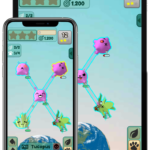 The so called ‘serious gaming’ industry is booming. Whereas traditional games strictly try to entertain their players, serious games often have an educational motive attached to them. I’ve written about a few such games over the years that have attempted to give players insights into local planning matters and biology. The latest game of this ilk comes via a team from Imperial College London, who have launched a game that aims to educate players on ecosystems while also contributing to environmental research.
The so called ‘serious gaming’ industry is booming. Whereas traditional games strictly try to entertain their players, serious games often have an educational motive attached to them. I’ve written about a few such games over the years that have attempted to give players insights into local planning matters and biology. The latest game of this ilk comes via a team from Imperial College London, who have launched a game that aims to educate players on ecosystems while also contributing to environmental research.
The game, called EcoBuilder, is available on smartphones and tablets and aims to teach players how ecosystems work, while also crowdsourcing solutions to unsolved ecological puzzles. Players create their own ecosystem of plants and animals, throwing together species and deciding who eats who, with species either surviving or going extinct as a result.
The game engine is modelled on the same equations scientists use to understand real-world ecosystems, which the developers believe gives the game a high level of realism. This realism also means that the strategies used by players in the game could eventually inform conservation strategies in real life.
“This is a fun opportunity to contribute to research that could change policy and affect our natural world,” the developers say. “Players will learn about various ecological phenomena along the way, and their solutions could help real researchers to understand ecosystems better.”
Playing and learning
The developers took inspiration from a project designed to save habitat in Yellowstone National Park, where wolves became extinct and the elk population subsequently boomed. This in turn resulted in too much vegetation being eaten, and smaller animals struggling for survival.
After various failed attempts to manage the elk population, a pack of 14 wolves were reintroduced, which helped to restore balance to the ecosystem, although even this failed to restore things to previous levels. It’s the kind of scenario the developers wanted players to encounter in the game.
“Since scientific understanding informs governmental policy, one day the strategies designed by players may influence decisions made by real conservationists, just like those made to reintroduce wolves back to Yellowstone park,” they explain.
The game consists of two ‘worlds’, with the learning world teaching players about different sizes and biomasses of animals and plants, and how they interact with one another. The scenarios already have a clearly defined ‘right’ answer based upon existing research.
The research world then presents scenarios that lack this definitive answer, with players given various ecological puzzles to play around with. Data is collected as the players complete the game, and the researchers hope that this data can ultimately inform real world conservation.
“As well as crowdsourcing the intellectual power of the general public, the game has a powerful capacity for outreach and teaching purposes, as players learn how ecosystems function and why they may collapse from even small changes to their structure,” they explain.